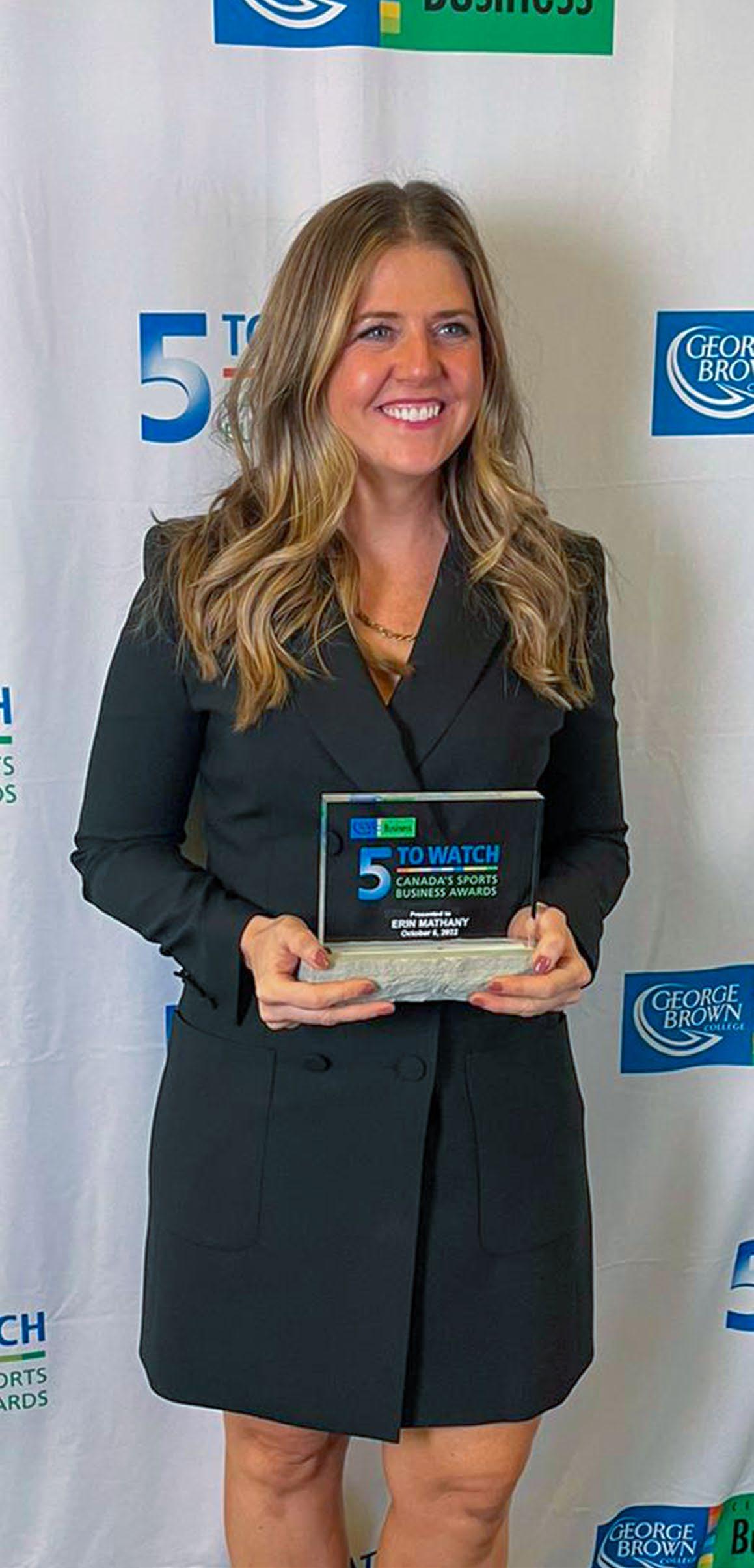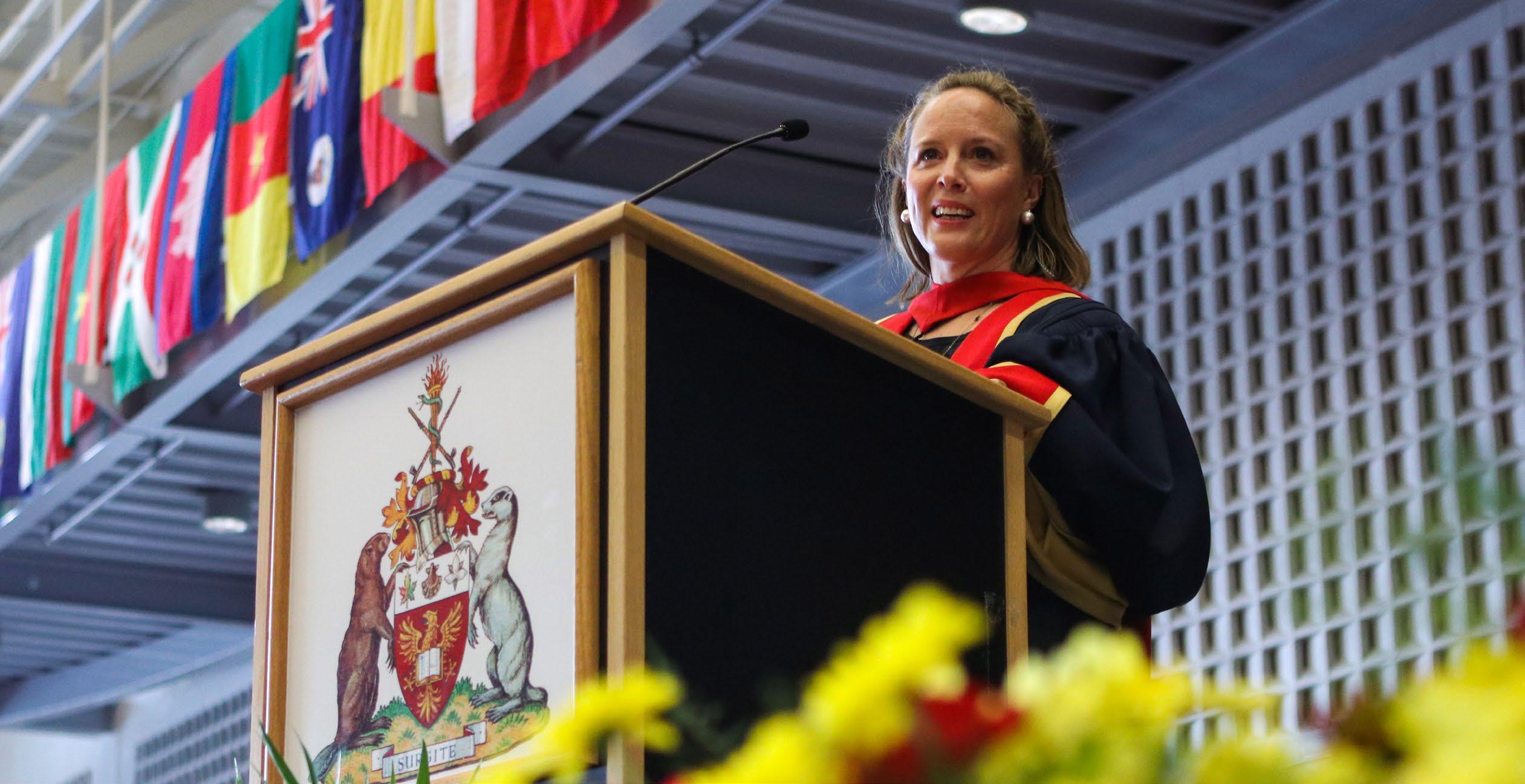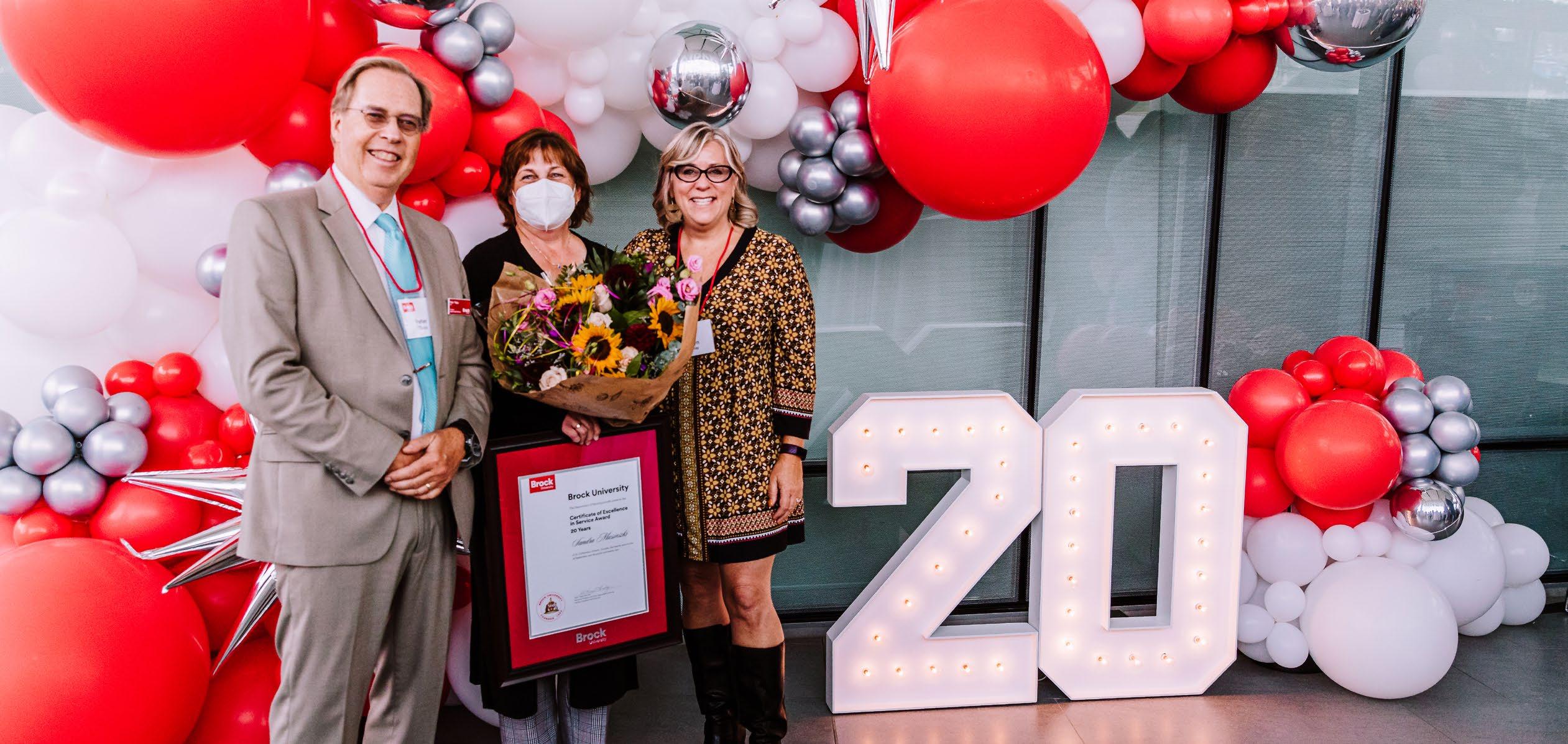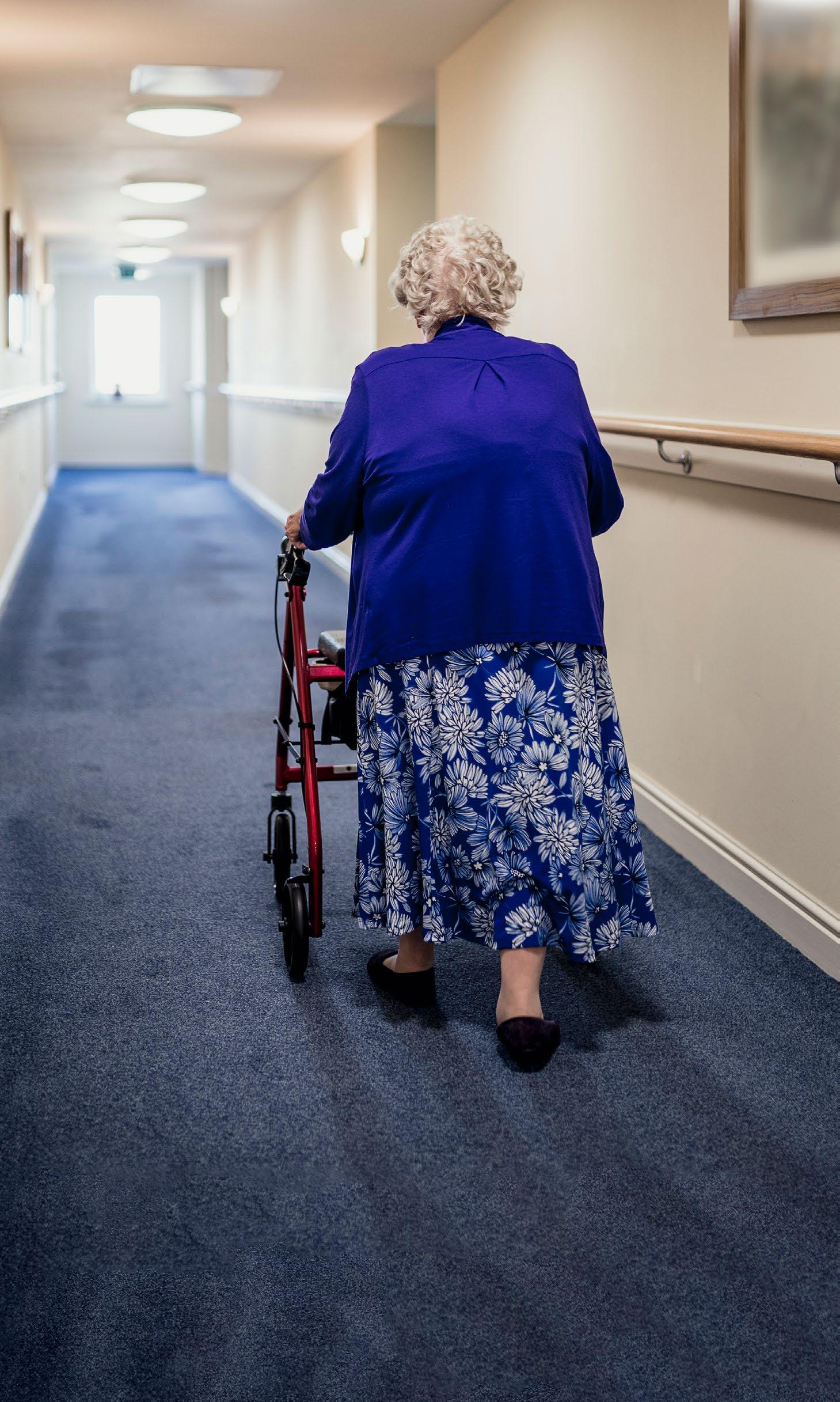 Elisabeth Walker-Young speaks out for inclusion and accessibility
Elisabeth Walker-Young speaks out for inclusion and accessibility


 Elisabeth Walker-Young speaks out for inclusion and accessibility
Elisabeth Walker-Young speaks out for inclusion and accessibility

Alumni and friends, welcome to the 2023 Alumni Insider.
This issue highlights some of the interesting and important accomplishments our faculty, staff, students and alumni have achieved over the past year.

I am particularly proud to note the work the Faculty of Applied Health Sciences (FAHS) has undertaken to help advance the University’s strategic priorities, which include fostering a culture of inclusivity, accessibility, reconciliation and decolonization.




As part of those efforts, the FAHS Anti-Racism Task Force held an event in the fall that highlighted ways to move forward with the decolonization of campus. The event, and the student research it featured, was informed by Indigenous perspectives and provided guidance on potential next steps to create meaningful change.
This year, the Faculty also introduced a diversity and inclusion student scholarship to contribute to equitable access to Applied Health Sciences education.
I hope you enjoy reading about these initiatives and the many other achievements in FAHS highlighted herein.
Best wishes and please stay in touch.
 PETER
PETER
The Department of Recreation and Leisure Studies (RECL) at Brock University celebrated its 40-year anniversary milestone with the launch of a RECL 40@40 social media campaign and a reunion that took place during Homecoming weekend.

The RECL 40@40 campaign, which began in June on the department’s @brockurecandleisure Instagram and @BrockRECL Twitter accounts, highlights accomplishments and growth from the past four decades.
Among the posts are a showcase of grads, their different careers paths and other activities they have pursued since finishing their studies, as well as contemporary and reflective archival photos.
“This social media campaign has been an opportunity for our alumni to engage with us by sharing images or content of them involved in different activities and providing us with updates on what they have been doing since their time on campus,” says RECL Associate Professor Martha Barnes (BRLS ’97).
The Homecoming reunion, Barnes said, was a perfect chance to give back to the people who have made the department what it is today.
“Many alumni have been supporting student learning and other department events throughout the years and we used this opportunity to express our appreciation,” she said. “This milestone was an important opportunity for us to connect and reconnect.”
Liquor has played a fundamental part in shaping the nation of Canada, from the local to the national level, says Dan Malleck.
The Professor of Health Sciences dove into the topic in his new book, Liquor and the Liberal State: Drink and Order before Prohibition, which examines liquor licensing in Canada prior to prohibition and looks closely at the law changes between 1867 and 1916, when prohibition began.

“A new law is the end of a process of change, and I wanted to understand where this came from,” he says.
Prior to prohibition, municipalities had the right to license the sale of liquor, making licensing taverns politically lucrative.
The temperance movement, while not politically powerful, was very vocal against alcohol. Politicians in power, on the other
hand, didn’t necessarily want prohibition, so the government began investigating and adjusting laws.
“At some point in my research, I realized they are all talking about what liberalism, liberty and freedom meant,” says Malleck. “The freedom to be free of the tyranny of alcohol versus the freedom to run their business as they wanted, the autonomy of the individual to make their own decisions about drinking versus the need to look after people who couldn’t look after themselves. These are the same issues we see today when any one group thinks they need to protect another group from themselves.”
The history of liquor is one of people socializing and generally behaving well, says Malleck. It can inform discussions about other issues, such as local option laws and cannabis.
Prof’s new book explores alcohol’s role in shaping CanadaDan Malleck, Brock University Professor of Health Sciences and Director of the Centre for Canadian Studies, has published a new book, Liquor and the Liberal State: Drink and Order before Prohibition, as well as a co-edited volume, Pleasure and Panic: New Essays on the History of Alcohol and Drugs. Recreation and Leisure Studies Associate Professor Colleen Whyte (left) welcomed alumna Rebecca Suprun (BRLS ’97) to the department’s 40-year anniversary reunion in September.
Garrick Forman (MSc ’19) demonstrates the ‘wristbot,’ a robot used to examine how the forearm muscles control the hand. This unique equipment is in a lab of the Centre for Bone and Muscle Health. Taking readings in the background is Brock Associate Professor of Kinesiology Michael Holmes.

Everyone knows consistent physical activity is key to building and maintaining a healthy body at every age — but it’s hard to move when bones and muscles aren’t working like they should.
“It’s super important that we take care of our bones and muscles, minimizing the effects of aging and inactivity, so we’re able to continue doing all the things we know will bring us many health benefits,” says Brock Associate Professor of Kinesiology Michael Holmes.
Holmes is at the helm of a 15-member group of researchers investigating the many intricacies of how bones and muscles do — and don’t — function, sharing their insights in a variety of ways.
Now in its 10th year, Brock University’s Centre for Bone and Muscle Health is celebrating a decade of successes that form the foundation for future growth, says Holmes, Canada Research Chair in Neuromuscular Mechanics and Ergonomics.

“We have a recognized centre housed in an academic institution that is a trusted resource for people seeking health knowledge,” he says. “We’re not interested in recycling old material; the Centre is the place for advances in research and trustworthy, up-to-date information.”
Holmes says the Centre’s focus over the next few years will be to build bridges with the public through its @brockucbmh Twitter and Instagram presence.
Professor
Kinesiology
Health
of Kinesiology
Three Faculty of Applied Health Sciences (FAHS) professors have received faculty fellowships that further support their research.
Professor of Kinesiology Bareket Falk, Associate Professor of Health Sciences William Pickett and Professor of Kinesiology (Primary) and Health Sciences Wendy Ward have been awarded FAHS Senior Research Fellowships.
“These three newly appointed FAHS Senior Research Fellows have been recognized for their research excellence, their extensive and leading research as well as their commitment to graduate
student mentorship,” says FAHS Dean Peter Tiidus.
The FAHS Senior Research Fellowship was created to support “worldclass” researchers in the Faculty who are pursuing and expanding their “internationally recognized cutting-edge research program,” says Tiidus.
This brings to five the total number of Fellowships to date.
Ward, Pickett and Falk join existing Fellowship holders Terrance Wade, Professor of Health Sciences, and Stephen Cheung, Professor of Kinesiology.
Criteria and standards for the five-year Fellowship, which can be renewed once, are modelled after those set out in the Canada Research Chairs program.
These include the need for researchers to be recognized internationally as leaders in their fields; outstanding and innovative world-class researchers whose accomplishments have made a major impact; have superior records of attracting and supervising graduate students and post-doctoral fellows; and be proposing an original, innovative research program of the highest quality.
Aunique experiential learning opportunity came to fruition for a group of Brock University Sport Management (SPMA) students this summer.
When the long-anticipated Niagara 2022 Canada Summer Games began Aug. 6, it kicked off the penultimate experiential learning chapter in the SPMA 498 Major Games Field Course, which connects students directly to major sporting events.
“The students were so excited. To get the hands-on skills and to see, from the inside, how a multisport event works are invaluable experiences,” said Associate Professor Laura Cousens, who has taught the course for more than a decade. “There’s something special with all of this build-up and work having gone into these Games, because they were delayed due to the COVID-19 pandemic. Our students had a unique opportunity to get involved with committees and roll up their sleeves in the extended planning process.”
More than 80 Brock students were involved in the pre-event
planning and volunteered during the Games through various roles, including marketing, event services, technology, medical, language services and volunteer recruitment, among others.

The course was designed for students seeking experiential opportunities in their field of study and focused on four key sections: Spectator Engagement, Athletes’ Village and Polyclinic, Social Media and Media Operations.
The Major Games Field Course has played a key role in more than 400 Brock students landing career opportunities at multi-sport events, the Canadian Olympic Committee, the Commonwealth Games and the North American Indigenous Games.
“You can learn all of the theory and read every one of the articles, but when I visit students at the Games and they are executing everything we’ve been talking about, that is the takeaway,” Cousens said. “The on-site critical thinking, problem solving, strategic planning and cultural awareness through volunteer experience is a game changer.”
Claire Barker is ready to lead. After participating in a three-day program at Brock University in August, the 12-year-old ringette player from Niagara Falls left ready to inspire others when she returned to the ice.
The Lead Like a Girl initiative, which welcomed more than 50 young women between the ages of 11 and 13 to campus, aimed to help its participants build confidence, develop leadership skills and find inspiration.
Organized by Brock’s Centre for Sport Capacity (CSC), each day saw participants take part in talks with various leaders in women’s sport in the morning before watching elite women in action as they visited events at the Niagara 2022 Canada Summer Games in the afternoon.
CSC Director Julie Stevens said the chance to interact with the young women and share her own journey rekindled memories and lessons to share from her years of playing and coaching hockey, while also reinforcing a powerful sense of advocacy on behalf of girls through sport.
“When you are a researcher, sometimes your connection to the work you do is a little removed,” said the Professor of Sport Management. “Being able to inspire these young women helps me to connect what I do as a scholar to my values as a person and reinforces my belief in connecting with people through research and translating it to opportunity.”
The lessons being shared by Stevens, and the program’s other presenters resonated with Barker, who said she’s hoping to expand her sport leadership role.
“I’d really like to coach,” she said. “This program is helping me learn how to do that early, and I’ll have the fundamentals to take the coaching courses as soon as I can.”
Learn more about the Lead Like a Girl program at brocku.ca/sport-capacity/ services/lead-like-a-girl
When Erin Mathany (BSM ’05) was a student in Brock University’s Sport Management program, the sport industry was dominated by men.
Two decades later, she is being recognized as one of 2022’s ‘5 to Watch’ in sport business amongst the firstever all-women cohort of award recipients.

Presented by George Brown College in partnership with The Globe and Mail, the 5 to Watch — Canada’s Sports Business Awards celebrate sport business professionals who have achieved significant success and impact during the early and middle stages of their careers before the age of 40.
Since graduating from Brock, Mathany has ascended the sport business ladder — from managing partnerships and commercial rights with the Vancouver Organizing Committee for the 2010 Olympic and Paralympic Winter Games and directing commercial affairs and business development with the Canadian Olympic Committee, to overseeing marketing, communications and partnerships with the Canada Games Council. Now, as Senior Vice-President of Marketing for the Vancouver Whitecaps Football Club, Mathany oversees brand, marketing and digital content as a member of the senior executive team.
“I’ve always been curious and eager to learn and try new areas of the business — I’ve taken some leaps to get to where I am in my career,” she said of pivoting from sponsorship and business development to senior marketing roles. “I wanted to try out the marketing side of the business, and that led me to the Canada Games Council, where my team and I renovated the brand with a new logo, look, feel and tone of voice. From there, I was able to shift to pro sport with the Whitecaps in a marketing role that I’m really excited about.”

Mathany is honoured to be recognized for her efforts and is thrilled to be part of a group of all-women award recipients.
“This first class of all women speaks to the powerful connections right now among us and the momentum for supporting women and girls working and competing in sport,” she said.
 Four-time Paralympian Elisabeth Walker-Young (left) was presented an honorary doctorate by University Chancellor Hilary Pearson during the University’s 112th Convocation Friday, Oct. 14.
Four-time Paralympian Elisabeth Walker-Young (left) was presented an honorary doctorate by University Chancellor Hilary Pearson during the University’s 112th Convocation Friday, Oct. 14.
urges Brock grads to speak up against acts of hate, discrimination
TWalker-Young’s (BPhEd ’02) life when she wishes she had spoken up.
Once, in the mid-’90s, she heard her swim teammate make a racist comment to an airport porter. Years later, she was on a crowded bus when one passenger made a racist and ageist remark to another rider. And, more recently, she witnessed her daughter get teased by a child for having a mom who was disabled.
Each instance left her filled with anger and sadness. Though she felt compelled to intervene, she stood idly by.
But the four-time Paralympian and Physical Education alumna, who received an honorary doctorate during Brock’s 112th Convocation Oct. 14, is actively working to change that pattern — and she’s encouraging others to do the same.

During her Convocation address, the Brock alumna and member of the Order of Canada asked the University’s newest graduates to reflect on a similar time in their own lives when something happened that they knew wasn’t right, but rather than speak up, they remained silent.
“I want you to think back to a time or a situation … where someone said or did something discriminatory, homophobic, racist, xenophobic, ablest — something that was unkind or unsettling,” said Walker-Young, who is nationally recognized not only for her athletic ability, but also for her advocacy work for inclusion and accessibility. “If you have remained silent in a situation like this, raise your hand.”
As a sea of students and their guests with their hands held high acknowledged their own experiences, Walker-Young explained that they are not alone.
are many reasons to do so, she said, whether out of concern for physical or emotional safety, or due to power dynamics at play.
“But when we stay quiet, we are complicit in the behaviour. In a way, we are condoning it,” she said.
While saying nothing in these challenging circumstances may be a common fault in society, Walker-Young assured the crowd there remains opportunity for change.
“Very often the people who are on the receiving end of these situations have less power in our society. They’re targets of imbalances and harmful actions,” she said. “What if more of us could disrupt those conversations?”
She encouraged her fellow Badgers to become ‘active bystanders’ and amplify the voices of others.
“If all of us did it, we’d make this world and the communities we live in a little bit safer and allow people to bring their authentic selves everywhere they go,” she said.
Walker-Young said active bystanders who were in her corner as a high-performance studentathlete at Brock had a tremendous impact on her life.
Brock is where “I found, or settled into, my identity,” she said. “Believe it or not, with a visible, physical disability, I never identified as disabled.
“Disability comes with a negative connotation, but a handful of people, many of whom are here today, were active witnesses in my life.… Their speaking up, their amplifying of my voice, was everything to me.”
Walker-Young urged the Class of 2022 to form a “network of allies, accomplices and activists” who can support one another in speaking up and helping to better society.
Scan to watch Walker-Young’s full Convocation address

Scott McRoberts (BSM ’02) is passionate about sport. Early on in life, he learned the many opportunities sport can offer and became committed to making sport programs accessible for all.
“I believe sport can be fundamental in shaping the lives of individuals and is an integral aspect of healthy communities,” says McRoberts, who was honoured during Brock’s Homecoming weekend as the Faculty of Applied Health Sciences Distinguished Graduate Award recipient.
During his time as a Brock Sport Management (SPMA) student and Badgers varsity athlete in tennis, McRoberts learned to embrace the opportunities available to him. At the time of graduation, this meant pursuing his master’s in Sport Management at the University of San Francisco, where he graduated with the second highest academic standing of his class.
In California, McRoberts worked in various areas of sport management at both the university and community level. Throughout, he maintained his connections at home and used his expertise to lead volunteers at National Collegiate Athletic Association (NCAA) events.
Never losing sight of the opportunity to lend a hand to the field’s next generation, McRoberts partnered with Brock’s SPMA Major Games course in 2007 to provide experiential learning opportunities for more than 20 students, who were able to work with him on two NCAA tournaments.
“Brock prepared me for my future, I was encouraged to get out and put myself in uncomfortable situations,” he says. “Being able to provide SPMA students with a learning experience and chance to achieve their goals was a great way for me to help give back.”
Since March 2016, McRoberts has been the Athletic Director at the University of Guelph. He is also Associate Director of the International Institute for Sport Business and Leadership at the Lang School of Business.
“Each day, I work towards an integrated vision of student and community engagement and athletic excellence,” he says.
McRoberts also serves as Vice-Chair of the Board of the Wellington Dufferin Guelph Children’s Foundation and Executive Board Member of the Guelph Giving Pledge, which raise funds for homelessness, mental health supports for youth and food insecurity in southwestern Ontario.
While his efforts have unquestionably impacted the lives of many colleagues, students and community members, McRoberts’ greatest joy is the time he spends with his boys, his wife Kate and their rescue dogs.

Faculty
For the past two decades, graduates of Brock University’s Nursing program have been making a difference in hospitals, health-care settings and the community.
Those meaningful contributions were celebrated in September during a reunion held to mark the program’s 20th anniversary. A first for the Department of Nursing, the reunion was part of Brock’s annual Homecoming celebration and coincided with the official grand opening of the department’s new Nursing Clinical Simulation Lab.
“Our graduates have a reputation for being outstanding because of the education they receive, the experiences they encounter in our labs, and because of the amazing community and clinical partnerships we have,” said Department Chair Karyn Taplay, while noting the significant growth Brock Nursing has seen as a result.
The department has nearly doubled in size in the past two years.
The reunion was an opportunity to not only celebrate that growth, but also to reflect on and recognize those who helped lay the groundwork for the program.
“It’s hard to encapsulate how much growth has occurred from where I started with a fledgling program to where it is today. The growth is amazing,” says Nursing Clinical-Practicum
BY COLLEEN PATTERSONCo-ordinator Sandra Micsinszki (MEd ’02), who has been with Brock Nursing since its beginning. Micsinszki was recognized at the event for 20 years of service excellence to the department.

“This recognition is so thoughtful, and reflective of the emphasis our department puts on the importance of relationship building,” she says.
Training future nurses remains a priority for Brock, as it continues to help respond to the changing health needs in Niagara and Ontario that have emerged due to the COVID-19 pandemic.
“The important contributions and leadership Brock Nursing students and graduates provide to the health of citizens in Niagara, the province of Ontario and beyond, help to address systemic gaps and improve quality of care for patients,” says Faculty of Applied Health Sciences Dean Peter Tiidus. “More broadly, the growth of our Nursing program and the learning opportunities we provide enable our graduates to embark on career paths that respond to the changing health needs of Canadians.”
Looking to the future of Brock Nursing, Taplay says, “our ability to deliver high-quality nursing education is enhanced thanks in part to the mentorship opportunities students receive from our grads working in a wide range of health-care careers across Niagara, in both community and hospital settings.”
Co-ordinator
Locating someone who lives in a long-term care facility can be challenging. Residents may not always be in their room when a family member comes to visit or when it’s time to take medication.

It’s now possible for staff to remotely monitor movements and location through a bracelet residents wear on their wrist. But is this indoor locating technology the best way to handle this situation, from the standpoint of the wearer?
Alisa Grigorovich aims to find out. AMS Healthcare has awarded the Brock Assistant Professor of Recreation and Leisure Studies a fellowship to explore the perspectives of the individuals who are wearing these bracelets and their care partners.
“We will find out from them what they see as the benefits and drawbacks of this type of system, as well as its impact on their everyday life and relationships,” says Grigorovich, a social gerontologist who studies the use of technologies in aged care.
“We will also ask them for suggestions for improving how these kinds of systems are rolled out and used in line with their preferences and values.”
The goal of this research is to gain a clear understanding of people’s experiences with the technology, along with its impacts and the values that underlie decisions to either adopt or refuse the system.
“There’s a lot of hope and ideas about what these technologies potentially could help with in long-term care, but there’s been very little research to demonstrate their actual impacts,” says Grigorovich.
Besides saving time and inefficiency in physically locating residents, real-time location systems can also be used to develop clinical tools to assess someone’s physical and mental health by measuring the amount and distance they move across space and time, how frequently they interact with other individuals or the environment, or to alert staff if they’re in a location that could be potentially unsafe, she says.
However, electronic surveillance of older adults also raises important ethical concerns, including what information should be collected and if it can be used in ways that balance older adults’ rights to freedom and independence with the duty of care, says Grigorovich.
Concerns include an invasion of privacy, unfair restrictions on activities and movements, and negative impact on care relationships, she says.

At the height of the COVID-19 pandemic, inequities that too often remain invisible in mainstream society began to surface. At the same time, it was becoming apparent marginalized individuals were at further risk of falling through systemic cracks.
When the formation of the BrockNiagara Centre of Excellence in Inclusive and Adaptive Physical Activity (CAPA) was approved in December 2020, its Director Maureen Connolly saw it as a chance to ensure programs would still be available when restrictions cleared.
“While the creation of a research centre had been in the works for some time, it was certainly timely that we could begin to move ahead in the midst of COVID,” Connolly says. “We knew we had to be adaptable in different ways because within the disability community there was a wide range of challenges impacting how people were thriving.”
The purpose of CAPA is to promote and enhance awareness and development of inclusive and adaptive physical activity programming and to engage in research, scholarly activity and knowledge translation about inclusive and
adaptive physical activity and its associated socio-cultural affordances and constraints.
For two years, CAPA has been providing authentically inclusive programs, workshops, courses, research projects and services to the Niagara community. It has also enabled many of Brock’s adaptive physical activity programs and services offered over the past 25 years — such as Supporting Neurodiversity through Adaptive Programming (SNAP), Saturday SNAP, Autism Spectrum Disorder Summer Movement Camp, and Side by Side, among others — to continue to respond to community needs.
“Everything SNAP, the programs and the research has always been about responding to community need,” Connolly says. “Being a research centre allows us to further tap into our participants’ and community members’ life experiences and insider knowledge.”
As current and future research projects are designed, a goal of CAPA is to represent the day-to-day
engagements disabled people have with physical activity both accurately and responsibly, and to provide analysis and interpretations that will inform systemic change and authentic community support.
“Disabled people are expert citizens and their well-being and collective empowerment is at the heart of our research and service commitments,” Connolly says.
Among these service commitments, CAPA, in partnership with Brock’s Faculty of Applied Health Sciences, successfully hosted the North American Federation of Adapted Physical Activity Symposium, an impactful biennial event held in October that brought together scholars and practitioners in areas of inclusive and adaptive physical activity, kinesiology, physical education and disability studies. CAPA also regularly hosts webinars that bring together community leaders and researchers to discuss current and emerging topics.
Learn more at brocku.ca/capa
Members of the Brock community came together this fall to explore what it means to decolonize the University’s campus and consider future steps to contribute to that change.
More than 80 Brock students, staff and faculty gathered in October for Decolonizing our Campus, an event hosted by the Faculty of Applied Health Sciences (FAHS) Anti-Racism Task Force, known as the ART initiative.

The first-of-its-kind event for the ART initiative was part of a larger Faculty goal of transforming toward more inclusive, equitable and just intellectual spaces. This also reflects the University-wide strategic priority of fostering a culture of inclusivity, accessibility, reconciliation and decolonization.
Led by a group of students, staff and faculty who identify as Black, Indigenous or as a Person of Colour and their allies, the event invited key internal stakeholders
to present on a panel and facilitate small discussion circles.
Setting the tone for exploring recommendations, an Indigenous Student Research Showcase featured a participatory action research project, “Decolonization, Transformative Learning Experiences, and Brock University: Challenging Assumptions that ‘this is the way it has to be.’”
The research team, including fifthyear Neuroscience student Ryanne Logan, fourth-year Medical Sciences student Kiara Kalenuik, second-year Child Health student Tory Shklanka and FAHS graduate students Kian Rego (BSc ’22) and Kahlan Woodhouse (BPH ’22), worked collaboratively between fall 2020 and fall 2021, initially as part of a directed reading course that later transitioned into a research project.
“Focusing on the importance of positionality and reflexivity, our methodological approach challenges Western ways of knowing and is
based in a ‘nothing about us without us’ approach to research,” says Logan. “Our approach was unique in that we were both the researchers and drew on our own experiences of what we were researching.”
Each student was given the opportunity to code and analyze data using a method that resonated with their own worldview, which included utilizing First Nations, Inuit or Western frameworks.
“What was significant was even though we coded using different approaches, a lot of the themes we each came back with were the same,” says Logan. “One of the biggest takeaways from this research is there are different ways to learn. For me personally, I gained knowledge while at the same time, learning more about my own Indigeneity and what that looks like as an Indigenous woman in academia.”
The FAHS ART initiative plans to host its second event in January that will focus on themes addressing anti-Black racism in institutions and academic practices.

Anew Faculty of Applied Health Sciences (FAHS) fundraising initiative is aiming to increase representation of and support for Black, Indigenous and People of Colour (BIPOC) students enrolled in the Faculty’s programs.
“We recognize the strength and benefits a diverse population brings to our community,” FAHS Dean Peter Tiidus says. “The University remains committed to building an inclusive and diverse population representing students of the past, present and future. As a Faculty, we strive every day to see this important work gain momentum.”
In response, a new Faculty of Applied Health Sciences Diversity and Inclusion Award has been launched. These awards will be granted to FAHS students who self identify as BIPOC or under-represented to increase inclusion and representation.

“In order to continue providing high-quality and forwardthinking education to all of our students, we must immerse them in an authentic community built of classmates, leaders and faculty from diverse groups,” Tiidus says.
Knowing the success of Brock’s strategic priorities is largely dependent on the participation of the whole community, Tiidus is calling on alumni for continued support of the initiative.
“We look to Brock’s guiding values in developing the future of the Faculty and we also look to our community to help us ensure that future is one of diversity,” he says.

The Centre for Sport Capacity is a hub for research, student experiential learning, and practical support to organizations. We can meet your workplace and volunteer needs. Check out these offerings!
